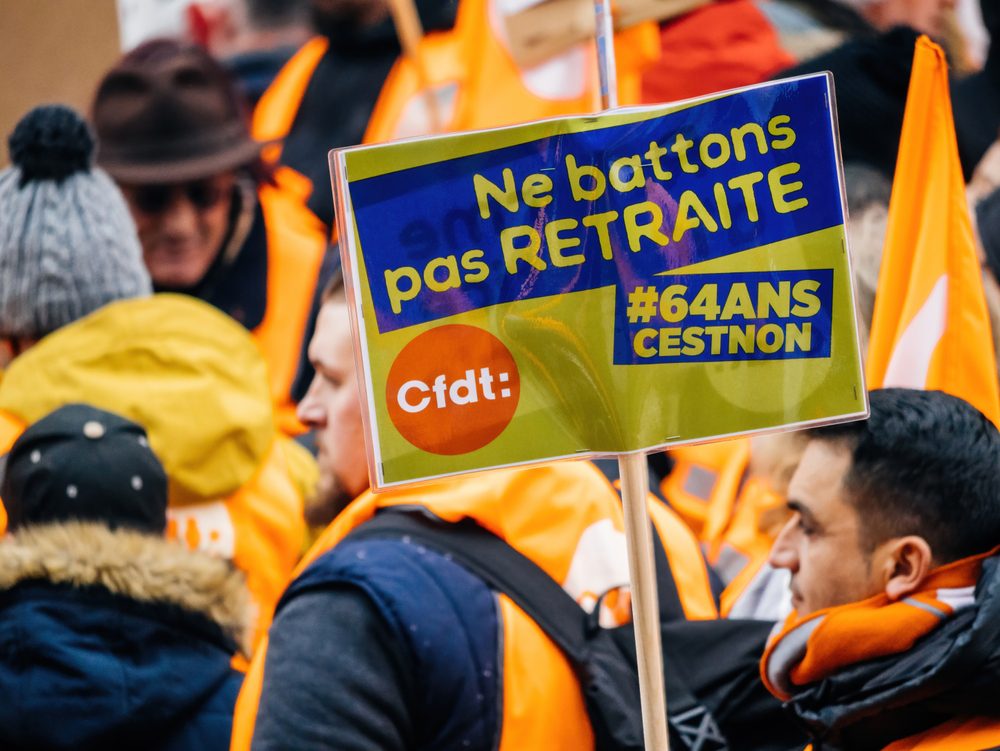
The mobilisation against pension reform is taking hold in France. A new day of strikes and demonstrations brought together up to 2.8 million people on Tuesday, January 31st, according to the unions, while the government recorded the participation of 1.2 million people.
Participation has increased since the previous day of demonstrations, January 19th. On Sunday, January 29th, on the eve of the examination of the project in committee in the Assembly, Prime Minister Elisabeth Borne indicated that the postponement of the retirement age from 62 to 64 years was “no longer negotiable.” The statement gave demonstrators the impression that no discussion was possible with the government, which reinforced their motivation to march to show their disagreement.
If the general participation was larger on this second day, some sectors recorded a decrease in mobilisation, as in the SNCF, where 36.5% participated in the strike compared with 46.3% during the first day. The number of strikers in national education was also slightly lower. On the other hand, the energy sector was once again strongly mobilised. The demonstrations took place in a calm atmosphere throughout the country, without any major violence or disturbances. In Paris, the police made 23 arrests, compared with 38 on January 19th.
At the end of the day’s strike, Prime Minister Elisabeth Borne announced that she had heard the “questions” and “doubts” raised but wanted to continue the debate in the national assembly.
La réforme des retraites suscite des interrogations et des doutes. Nous les entendons. Le débat parlementaire s’ouvre. Il permettra, dans la transparence, d’enrichir notre projet avec un cap : assurer l’avenir de notre système par répartition.
— Élisabeth BORNE (@Elisabeth_Borne) January 31, 2023
C’est notre responsabilité !
The government party is concerned. Since they do not have a majority, the support of the centre-right Republican group is essential for the reform to be adopted. However, signs of tension are appearing within Les Républicains: out of the 62 deputies, ten or so may not vote in favour of the reform. These rebels echo their meetings in their constituencies.
“This weekend, I have not met a single person who told me to vote for the reform, including among the LR activists,” explained the deputy of the Oise department, Maxime Minot, in Le Parisien.
Elisabeth Borne discreetly received Olivier Marleix, the president of the LR parliamentary group, and Éric Ciotti, the president of the party, to obtain the unanimity of the group. Without the massive support of Les Républicains, the government could be forced, once again, to use article 49.3 of the Constitution to force through the reform, which would only increase its unpopularity and lack of legitimacy.
The left-wing coalition of NUPES and the Rassemblement national embody the opposition to the reform. Both the NUPES and the RN have put forward referendum motions against the bill. This is a mechanism to request that a referendum be held to consult the people about the bill—an idea supported by 70% of French people.
Le référendum est la seule solution pour contraindre le gouvernement à retirer sa réforme injuste des retraites. Les Français doivent pouvoir décider de leur avenir. Ils sont 7 sur 10 à le souhaiter ! https://t.co/kqq9XYv0kU
— Marine Le Pen (@MLP_officiel) February 1, 2023
The referendum motion proposed by the Rassemblement National was drawn at random to be examined by the deputies—a procedure never before used in the political process. The deputies of the left-wing coalition are thus faced with a difficult choice: assert their desire for a referendum and vote for the referendum motion proposed by the RN, or refuse to stand by the party of the national Right and make the possibility of a referendum fail. For the time being, the troops are divided on the attitude to adopt.
The unions have already called for two new days of action on February, 7th and 11th, i.e., at the very beginning of the winter school holidays, triggering protests from Minister of public accounts Gabriel Attal, who asked that the strikers “respect” the holidays.
